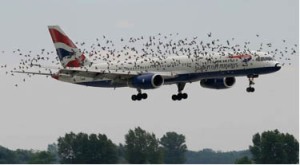A focus on unusual and strange occurrences during flight operations
English learning advice from Aviation English Asia. Article written by Michael McBride. How would you communicate the following situation to the controller? 
In this article I'm going to explain the different components of Aviation English, and explain why English is important and essential for communication in unexpected situations.
Summary of Aviation English language
Aviation English (AE) is split into three key areas;
- Phraseology,
- Plain English used in an aviation context and
- General English.
All three areas work side by side to create language ‘moments’ in the sky and on the ground. Phraseology is the scripted communication that every pilot and controller has been trained to use. Plain English is a way to communicate simply without use of over-complex language. It may help to aid understanding and deliver the meaning of something and indeed save lives in certain situations. General English is not a specific part of many Aviation English courses but it is integrated and assumed. You need General English as the foundation before you add the building blocks to create your dream home. The main rule is that you cannot have one linguistic area without the other. It is a fair assumption that some people discredit or rather devalue the use of ‘plain’ and General English in Aviation English, but the International Civil Aviation Organisation (ICAO) completely disagree. ICAO state that pilots/controllers at level 4 standard can “handle successfully with relative ease the linguistic challenges presented by a complication or unexpected turn of events.” After all, unforeseen events in the sky may not be as predictable as a holding pattern around London Heathrow.
Phraseology will not get you out of every situation
The official phraseology used by aviation personnel is highly specific and fine-tuned, it will form the basis of all flights, and is indeed a ‘special’ feature of Aviation English. Phraseology is the result of decades of expert knowledge due to accidents, incidents and logic. The framework needed to get from A to B safely. However, it is not enough and you need Plain and General English to get you out of strange and unpredictable problems.
English is one of the most important aspects of ICAO level 4+ language testing. For example, what if there are animals loose in the aircraft? What if there is a piece of luggage blocking the taxiway? How would you explain this to a controller in English? Professional Aviation English training with Aviation English Asia will help you integrate all 3 aspects of Aviation English language. This is done by training you to use a wide range of language skills to get you out of those ‘sticky situations’ when you need to explain an unusual situation. The ICAO level 4 requirements state, “(this person) can often paraphrase successfully when lacking in vocabulary for unexpected circumstances.” This requirement means that you do not need to know every word in aviation or general English, but you do need to know how to get around not knowing certain vocabulary.
Advice on how to communicate in unusual situations
It is essential for any uncertain communication that you maintain a connection with the pilot or controller, “checking and maintaining exchanges in unexpected turn of events” (ICAO). Aviation English training can help you to build solid communication strategies to solve these communication difficulties and ‘fly out of danger.’ In the classroom or online course you will get plenty of practice on using these language skills. Relevant grammatical structures include include stock phrases such as:
- [subject] is similar to…
- [subject] is like…
- [subject] looks like...
- [subject] appears to be...
- [subject] seems to be...
and stock phrases/expressions to help you describe unusual situations. You will also be trained to create and change words to combine both simplicity and clarity in your exchange over the radio. You cannot use a dictionary in your ICAO test and you cannot search for one in your cockpit! A wide vocabulary is very important in aviation as you might be communicating with another non-native speaker that doesn't recognise the words that you used. You will need to learn how to paraphrase so you can use alternative words. You will learn aviation-related words as part of your pilot/controller training and also in Aviation English training.
It is advisable to learn words in groups, such as technology, mechanical parts, weather related etc. It is much easier for you to learn when you can see a pattern. It is also good for your wider English knowledge to study word families – receive, reception, receiving…etc. And it is a good additional communication strategy to find words with the same meaning, these are called ‘synonyms’, eg, fire, blaze, explosion etc. Maybe you will remember one word more than others. For more practical study, try creating situations and imagine how you would communicate it. For example, animals escaping into the terminal, damage to aircraft by animals. Then think of the connected vocabulary – containers, cages, hinges... What information is key when listening? And if the person you are speaking to doesn't know what a “cage” is, how could you communicate this?
How would you communicate these problems?
- A lot of cargo + gate
- Animal + in terminal
- Rain + window
For feedback on your answers please email
Checklist
- Phraseology is vital but is also not enough
- Communication strategies
- Structured learning of words, phrases etc
What to do next
For more information about Aviation English Asia’s courses please visit aviationenglish.com

.jpg)